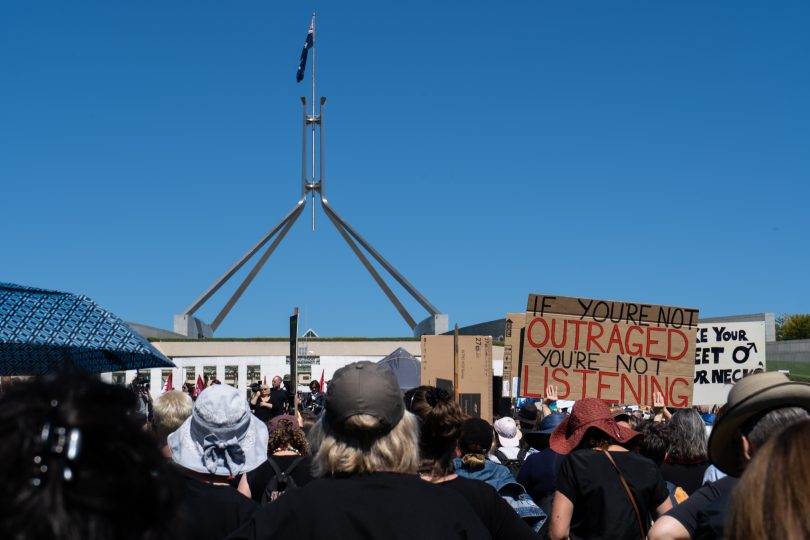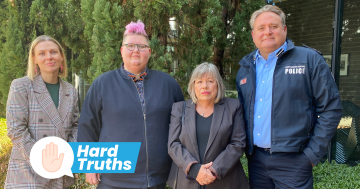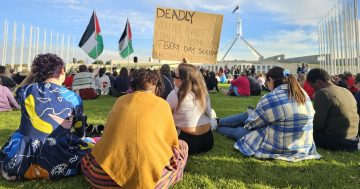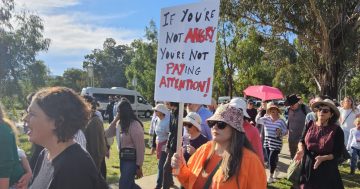
As the sound of community chants and solidarity fades away again, DVCS CEO Sue Webeck offers suggestions for action to take in our daily lives. Photo: Region.
The nation was swept with a sense of urgency and a need to do something. More women’s names were highlighted in nightly news bulletins and newspaper front pages. Not because of their successes or their achievements, but because they were murdered by someone who was supposed to love them.
One woman every four days in this country is murdered by a man’s use of violence.
So again, like so many times before, we rally. We march all the way to the lawns of Parliament House and the doors of power and spend our afternoon demanding more for our community. We marched with signs that said, “I can’t believe we are still marching for this”, or “I marched with my mum, and now I march with my daughter”, and, of course, “Enough is enough”.
The demands are simple, including more support services for people experiencing violence, more accountability for those using violence and more to stop violence before it occurs.
A few days later, governments announced a small bucket of funding or a new program that would help some people with some of the things they need, the extension of an old program. But it isn’t enough to meet the demand for services or make the deep-seated cultural and attitudinal change we need.
And then the media attention slowly goes quiet and shifts to something else and the sound of community chants and solidarity fades away. We have seen this many times over the decades. But what really changes?
I know what doesn’t change. Every day, as frontline services, we are here, march or no march. In fact, often, we are not marching because we are needed elsewhere. Answering the crisis calls, giving people a safe place to spend a few nights, or a mobile phone that isn’t being tracked, having deeply skilled discussions about safety and managing the risk someone is living with right in that moment.
We are grateful for the solidarity and the demands of the community. The solidarity in those moments is palpable. It supports the workers who work in the silence of our community, supporting those impacted by violence every day.
But we need more than a rally. We need more than your Sunday afternoon. We need you every day.
We need to create change in our community so that those who use violence against women are held accountable long before we talk about the person they murdered.
We need to role model men who provide examples of masculinity that enrich our community and show compassion and care. Toxic masculinity harms everyone – it dominates spaces and excludes men from participation and stops them from engaging in these conversations. We need to pave a new way forward for men and boys.
We need to hold ourselves to a standard of not making sexist or derogatory remarks about women or staying silent when someone else does. These early acts of violence against women serve as a societal entry to othering women, making them less than and available to hold a level of power over. It may feel like a harmless joke aimed at no one in particular. But the message it sends to the people around you can be sharp and clear: that women are not important, not equal, and lesser. That they are disposable.
Every woman whose life has been taken was a person with hopes and a community of people who love her. Their lives had immense value. They must not be treated as disposable.
So I urge you to continue to rally and march. To call for better services, secure funding for those services and more accountability from our governments. But also to think about your own role. We must all take this moment, among such tragedy, to reflect. Every one of us can count ourselves as the change we need to see in our communities.
How will you do that?
Sue Webek is the CEO of the Domestic Violence Crisis Service in Canberra.
If this story has raised any concerns for you, 1800RESPECT, the national 24-hour sexual assault, family and domestic violence counselling line, can be contacted on 1800 737 732. Help and support are also available through the Canberra Rape Crisis Centre on 02 6247 2525, the Domestic Violence Crisis Service ACT 02 6280 0900, and Lifeline on 13 11 14. In an emergency, call triple zero.





















